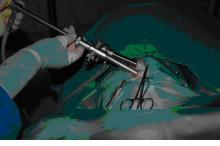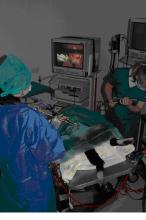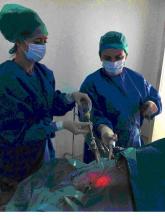In 2011 St Boniface Veterinary Clinic became one of a very small number of practices in the South West who offer keyhole neutering. Laparoscopic neutering is less invasive than open spay surgery resulting in a much shorter recovery time for your pet.
What is the difference between normal (open ovario-hysterectomy) and keyhole neutering (laparoscopic ovariectomy)?
Bitch spays are one of the most common operations performed in dogs at the clinic. The traditional open surgery involves abdominal surgery through a 2 – 10cm midline incision to remove both the ovaries and uterus. Removing the ovaries requires the stretching of the ovarian ligament which can cause some discomfort.
Benefits to keyhole neutering:
- Shorter recovery times and less need to restrict dogs for as long post surgery. Ideal for boisterous, active bitches or working and agility dogs.
- Smaller wounds – less time to heal
- Less discomfort generated by surgery
- Less scarring
- Less risk of infection
- In keyhole neutering the ovaries are removed by careful dissection through 2 small incisions using a camera for visualisation and special instruments to control any bleeding. This results in less pain during and following surgery.
Any breed of dog can be a candidate for keyhole neutering but unfortunately a number of dogs are not suitable e.g. overweight dogs, very small dogs, and dogs with a history of womb infections.
The average dog we see for keyhole neutering are young, slim and very lively, therefore the owners would struggle to restrain them for the standard 10-14 days convalescence period. Generally if a bitch has undergone laparoscopic neutering they can go back to their usual routines after 5 days.
When can I get my bitch neutered?
In general terms, we still advise that it is better for your pet’s overall health that they are neutered. The timing of the procedure appears to be more critical than previously thought and there is a lot of breed variation in relation to risk: benefit ratios.
As a general guideline we usually recommend small breed dogs (up to approximately 20kg adult weight) are spayed before their first season at 6months old. Large breed dogs may be better off being neutered between 12-18 months old as recent studies have revealed an increase in these dogs developing hip dysplasia and associated arthritis. The research suggests that early closure of the growth plates which occurs as a result of hormone changes from neutering may be a contributing factor, along with weight gain.
Importantly bitches should not be spayed when they are in season. To lower the risk of the surgery we recommend neutering 3 months post season.
At St Boniface Vets we are proud to offer two methods of spaying your bitch. The routine, open abdominal surgery, and the less invasive, laparoscopic (keyhole) surgery. Keyhole surgery allows your dog to resume normal activities sooner than abdominal surgery and is therefore favoured by many owners, especially those with working and agility dogs. We are happy to discuss the different techniques with you.




